- Home
- Jr. Horatio Alger
The Young Musician; Or, Fighting His Way Page 2
The Young Musician; Or, Fighting His Way Read online
Page 2
Will it be believed that, in spite of his homely face, Nick reallythought himself good-looking and aspired to be a beau? For this reasonhe had often wished that he possessed Philip's accomplishment of beingable to play upon the violin.
His conversational powers were rather limited, and he felt at a losswhen he undertook to make himself fascinating to the young ladies in thevillage. If he could only play on the violin like Philip he thought hewould be irresistible.
He had therefore conceived the design of buying Philip's instrument fora trifle, judging that our hero would feel compelled to sell it.
The reader will now understand the object which led to Nick's call sosoon after the funeral of Mr. Gray. He was afraid some one else mightforestall him in gaining possession of the coveted instrument.
When Philip saw who his visitor was, he was not overjoyed. It was withreluctance that he rose and gave admission to Nick.
"I thought I would call around and see you, Phil," said Nick, as he satdown in the most comfortable chair in the room.
"Thank you," responded Phil coldly.
"The old man went off mighty sudden," continued Nicholas, withcharacteristic delicacy.
"Do you mean my father?" inquired Philip.
"Of course I do. There ain't any one else dead, is there!"
"I had been expecting my poor father's death for some time," said Philipgravely.
"Just so! He wa'n't very rugged. We've all got to come to it sooner orlater. I expect dad'll die of apoplexy some time-he's so awful fat,"remarked Nicholas cheerfully. "If he does, it's lucky he's got me to runthe business. I'm only eighteen, but I can get along as well as anybody.I'm kinder smart in business."
"I am glad you are smart in anything," thought Philip; for he knew thatNick was a hopeless dunce in school duties.
"I hope your father'll live a good while," he said politely.
"Yes, of course," said Nick lightly. "I'd be sorry to have the old manpop off; but then you never can tell about such a thing as that."
Philip did not relish the light way in which Nick referred to such aloss as he was suffering from, and, by way of changing the subject,said:
"I believe you said you came on business, Nicholas?"
"Yes; that's what I wanted to come at. It's about your fiddle."
"My violin!" said Philip, rather surprised.
"Oh, well, fiddle or violin! what's the odds? I want to buy it."
"What for?"
"To play on, of course! What did you think I wanted it for?"
"But you can't play, can you?"
"Not yet; but I expect you could show me some--now, couldn't you?"
"What put it into your head to want to play on the violin?" askedPhilip, with some curiosity.
"Why, you see, the girls like it. It would be kind of nice when I go toa party, or marm has company, to scrape off a tune or two-just like youdo. It makes a feller kinder pop'lar with the girls, don't you see?"said Nick, with a knowing grin.
"And you want to be popular with the young ladies!" said Philip,smiling, in spite of his bereavement, at the idea being entertained bysuch a clumsy-looking caliban as Nick Holden.
"Of course I do!" answered Nick, with another grin. "You see I'm gettin'along-I'll be nineteen next month, and I might want to get marriedby the time I'm twenty-one, especially if the old man should drop offsudden."
"I understand all that, Nicholas--"
"Call me Nick. I ain't stuck up if I am most a man. Call me pet names,dearest."
And Nicholas laughed loudly at his witty quotation.
"Just as you prefer. Nick, then, I understand your object. But what madeyou think I wanted to sell the violin?"
It was Nick's turn to be surprised.
"Ain't there goin' to be an auction of your father's things?" he said.
"Yes; but the violin is mine, and I am not going to sell it."
"You'll have to," said Nick.
"What do you mean by that, Nicholas Holden?" said Philip quickly.
"Because you'll have to sell everything to pay your father's debt. Myfather said so this very morning."
"I think I know my own business best," said Philip coldly. "I shall keepthe violin."
"Maybe it ain't for you to say," returned Nick, apparently not aware ofhis insolence. "Come, now, I'll tell you what I'll do. My father's gota bill against yours for a dollar and sixty-four cents. I told fatherI had a use for the fiddle, and he says if you'll give it to me, he'llcall it square. There, what do you say to that?"
Nicholas leaned back in his chair and looked at Philip through hissmall, fishy eyes, as if he had made an uncommonly liberal offer. As forPhilip, he hardly knew whether to be angry or amused.
"You offer me a dollar and sixty-four cents for my violin?" he repeated.
"Yes. It's second-hand, to be sure, but I guess it's in pretty faircondition. Besides, you might help me a little about learnin' how toplay."
"How much do you suppose the violin cost?" inquired Philip.
"Couldn't say."
"It cost my father twenty-five dollars."
"Oh, come, now, that's too thin! You don't expect a feller to believesuch a story as that?"
"I expect to be believed, for I never tell anything but the truth."
"Oh, well, I don't expect you do, generally, but when it comes totradin', most everybody lies," observed Nick candidly.
"I have no object in misrepresenting, for I don't want to sell theviolin."
"You can't afford to keep it! The town won't let you!"
"The town won't let me?" echoed Philip, now thoroughly mystified.
"Of course they won't. The idea of a pauper bein' allowed a fiddle toplay on! Why, it's ridiculous!"
"What do you mean?" demanded Philip, who now began to comprehend themeaning of this thick-witted visitor. "What have I got to do with thetown, or with paupers?"
"Why, you're goin' to the poorhouse, ain't you?"
"Certainly not!" answered Philip, with flashing eyes.
"I guess you're mistaken," said Nick coolly. "Squire Pope was over toour shop this mornin', and he told dad that the seleckmen were goin' tosend you there after the auction."
Philip's eyes flashed angrily. He felt insulted and outraged. Never fora moment had he conceived the idea that any one would regard him as acandidate for the poorhouse.
He had an honorable pride in maintaining himself, and would rather getalong on one meal a day, earned by himself in honest independence, thanbe indebted to public charity even for a luxurious support.
"Squire Pope doesn't know what he's talking about," retorted Philip, whohad to exercise some self-restraint not to express himself more forcibly"and you can tell him so when you see him. I am no more likely to go tothe poorhouse than you are!"
"Come, that's a good one," chuckled Nick. "Talk of me goin' to thepoorhouse, when my father pays one of the biggest taxes in town! Ofcourse, it's different with you."
"You'll have to excuse me now," said Philip, determined to get rid ofhis disagreeable companion. "I have something to do."
"Then you won't sell me the fiddle, Phil?"
"No, I won't," answered our hero, with scant ceremony.
"Then I'll have to bid it off at the auction. Maybe I'll get itcheaper."
And Mr. Nicholas Holden at length relieved Philip of his company.
CHAPTER IV. THE AUCTION.
It so happened that Nick Holden met Squire Pope on the village street,and, being rather disappointed at the result of his negotiations withPhilip, thought it might be a good idea to broach the subject to thesquire, who, as he knew, had taken it upon himself to superintend thesale of Mr. Gray's goods.
"I say, squire, I've just been over to see Phil Gray."
"Ahem! Well, how does he seem to feel?"
"Kinder stuck up, I reckon. He said he wouldn't go to the poorhouse, andI might tell you so."
"I apprehend," said the squire, in his stately way, "he will be underthe necessity of going, whether he likes it or not."
/>
"Just so; that's what I told him!" interjected Nick.
"And he should be grateful for so comfortable a home," continued thepublic man.
"Well, I dunno," said Nick. "They do say that old Tucker most starvesthe paupers. Why his bills with dad are awful small."
"The town cannot afford to pamper the appetites of its beneficiaries,"said the squire. "Where is Philip now?"
"I guess he's at home. I offered to buy his fiddle, but he said he wasgoing to keep it. I offered him a dollar and sixty-four cents--the sameas dad's bill against his father, but he wouldn't take it."
"Really, Nicholas, your offer was very irregular--extremely irregular.It should have been made to me, as the administrator of the late Mr.Gray, and not to a boy like Philip."
"Will you sell me the fiddle for dad's bill, squire?" asked Nicholaseagerly.
"You are premature, Nicholas--"
"What's that?"
"I mean you must wait till the auction. Then you will have a chance tobid on the instrument, if you want to secure it."
"Phil says it's his, and won't be for sale at the auction."
"Then Philip is mistaken. He is only a boy. The estate will be settledby those who are older and wiser than he."
"I guess you'll find him hard to manage, squire," said Nick, laughing.
"We shall see--we shall see," returned the squire.
And, with a dignified wave of the hand, he continued on his walk.
After the visit of Nicholas, Philip thought it most prudent to conveythe violin which he prized so much to the house of his friend, FrankDunbar, where he had been invited to take his meals.
He was willing to have the furniture sold to defray his father's smalldebts, but the violin was his own. It had not even been given him by hisfather. Though the latter purchased it, the money which it cost had beengiven to Philip by a friend of the family. He rightly thought that hehad no call to sell it now.
"Frank," said he to his boy-friend, "I want you to put away my violinsafely, and keep it until after the auction."
"Of course I will, Phil; but won't you want to play on it!"
"Not at present. I'll tell you why I want it put away."
And Philip told his friend about Nick's application to purchase it, andthe liberal offer he had made.
"Nick's generosity never will hurt him much," said Frank, laughing."What in the world did he want of your violin?"
"He wants to make himself popular with the girls."
"He'll never do that, even if he learns to play like an angel!" saidFrank. "You ought to hear the girls talk about him. He couldn't get asingle one of them to go home with from singing-school last winter. Heteased my sister to go, but she told him every time she was engaged tosome one else."
The two days that intervened between the funeral and the auction passed,and the last scene connecting Philip with the little cottage which hadbeen his home was to take place.
In a country town, an auction-however inconsiderable-draws together aninterested company of friends and neighbors; and, though no articles ofvalue were to be sold, this was the case at the present sale.
Philip didn't at first mean to be present. He thought it would only givehim pain; but at the last moment he came, having been requested to do soby Squire Pope, as information might be required which he could give.
The bulk of the furniture was soon disposed of, at low prices, tobe sure, but sufficiently high to make it clear that enough would berealized to pay the small bills outstanding.
Philip's lip quivered when his father's watch was put up. He would haveliked to buy it, but this was impossible; for he had only about a dollarof his own.
Nick Holden's eyes sparkled when he saw the watch. He had forgottenabout that, but as soon as he saw it he coveted it. He had a cheapsilver watch of his own, which he had bought secondhand about threeyears before. He had thought that he might some day possess a goldwatch, but he was not willing to lay out the necessary sum of money.
By dint of actual meanness, he had laid up two hundred dollars, which henow had in the savings-bank in the next village, and he could thereforehave bought one if he had chosen; but, like Gilpin,
"Though on pleasure bent, he had a frugal mind."
Now, however, there seemed a chance of getting a gold watch at a lowprice. Nick reasoned rightly that at an auction it would go much belowits value, and it would be a good thing for him to buy it--even as aninvestment--as he would probably have chances enough to trade it off ata handsome profit.
"I shouldn't wonder if I could double my money on it," he reflected.
Accordingly, when the watch was put up, Nick eagerly bid two dollars.
Philip's lip curled when he heard this generous bid, and he heartilyhoped that this treasured possession of his dead father might not fallinto such hands.
Nick rather hoped that no one would bid against him, but in this he wasdestined to be disappointed.
"Five dollars!" was next heard.
And this bid came from Mr. Dunbar, the father of his friend Frank.Philip's eyes brightened up, for there was no one he would sooner seethe possessor of the watch than his kind friend.
Nick looked chopfallen when he heard this large increase on his originalbid, and hesitated to continue, but finally mustered up courage to say,in a rather feeble tone:
"Five and a quarter."
"Five dollars and a quarter bid!" said the auctioneer. "Do I hear more?"
"Six dollars," said Mr. Dunbar quietly.
The bid was repeated, and the auctioneer waited for a higher one, butNick retired ignominiously from the contest.
He wasn't sure whether he could get much over six dollars for ithimself, and he foresaw that Mr. Dunbar intended to have it, even if itcost considerable more.
"It's kinder hard on a feller," he complained to the man standing nexthim. "What does Mr. Dunbar want of the watch? He's got one already."
"Perhaps he thinks it is a good bargain at the price."
"It's what I've been wantin' all along," said Nick. "He might have letme have it."
"Why don't you bid more?"
"I wanted to get it cheap."
"And the auctioneer wants to get as much as he can for the articles, andso do Philip's friends," This was a consideration which, of course, hadno weight with Nicholas. However, he had one comfort. He would bid onthe violin, and probably no one else would bid against it. He did notsee it, to be sure, but concluded, of course, that it would be bid off.When the sale drew near the end, he went to Philip, and said:
"Whereabouts is the fiddle, Phil?"
"It isn't here," answered our hero.
"Ain't it goin' to be sold?"
"Of course not! It's mine. I told you that once already."
"We'll see!" said Nicholas angrily.
And going up to Squire Pope, he held a brief conversation with thatgentleman.
The squire nodded vigorously, and walked over to Philip.
"Philip," said he, "go and bring your violin."
"What will I do that for!" asked our hero quietly.
"So that it may be sold."
"It is not to be sold," returned Philip quietly. "It belongs to me."
"Nothing belongs to you except your clothes!" said the squire angrily."I require you to go and fetch the instrument."
"And I decline to do it," said Philip.
"Do you know who I am," demanded the squire, with ruffled dignity.
"I know you perfectly well," answered Philip "but I am the owner of theviolin, and I don't mean to have it sold."
"YOU will repent this!" said Squire Pope, who felt that his lawfulauthority and official dignity were set at naught.
Philip bowed and left the house. He did not know what steps the squiremight take, but he was resolved not to give up his cherished violin.
CHAPTER V. AN ALLIANCE AGAINST PHILIP.
Squire Pope was not a bad man, nor was he by nature a tyrant, but hewas so fully convinced of his own superior judgment that he was in allthing
s obstinately bent on having his own way. He had persuaded himselfthat our young hero, Philip, would be better off in the poorhouse thanin a place where he could earn his own living, and no one could convincehim to the contrary.
As to the boy's feelings on the subject, he considered those of noimportance. He had good reason to know that Philip would object to beingan inmate of the almshouse, but he was determined that he should gothere.
In like manner, before the auction was over, he saw clearly that itwould realize a sum more than sufficient to pay the funeral expensesof the late Mr. Gray and the few small bills outstanding against hisestate, and that there was no necessity that Philip's violin should besold, but none the less he resolved that it should be sold.
"Shall I allow a young lad to dictate to me?" Squire Pope asked himself,in irritation. "Certainly not! I know better what is right than he.It is ridiculous that a town pauper should own a violin. Why, the nextthing, we shall have to buy pianos for our almshouses, for the use ofthe gentlemen and ladies who occupy them. A violin, indeed!"
This Squire Pope regarded as irresistible logic and withering sarcasmcombined.
He saw Philip go out of the cottage, but, as the sale was not over, hewas unable to follow him.
"Never mind, I'll fix him as soon as I have time," he said to himself.
"Back so soon? Is the auction over!" asked his friend, Frank Dunbar, whowas engaged in splitting wood in the rear of the house.

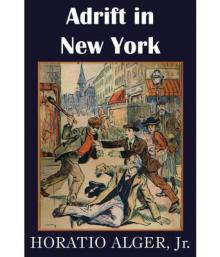 Adrift in New York: Tom and Florence Braving the World
Adrift in New York: Tom and Florence Braving the World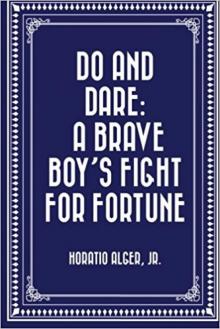 Do and Dare — a Brave Boy's Fight for Fortune
Do and Dare — a Brave Boy's Fight for Fortune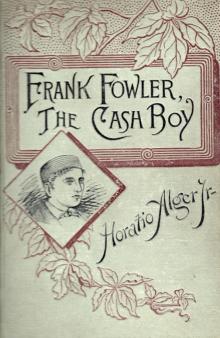 The Cash Boy
The Cash Boy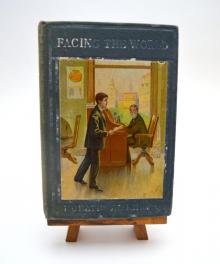 Facing the World
Facing the World The Young Explorer; Or, Claiming His Fortune
The Young Explorer; Or, Claiming His Fortune The Store Boy
The Store Boy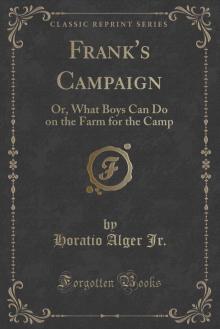 Frank's Campaign; Or, The Farm and the Camp
Frank's Campaign; Or, The Farm and the Camp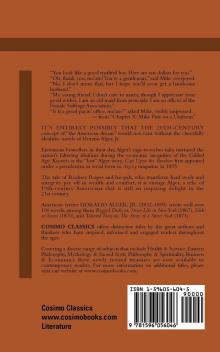 Cast Upon the Breakers
Cast Upon the Breakers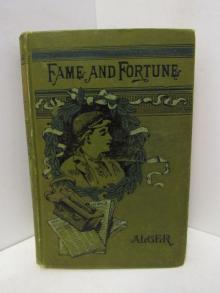 Fame and Fortune; or, The Progress of Richard Hunter
Fame and Fortune; or, The Progress of Richard Hunter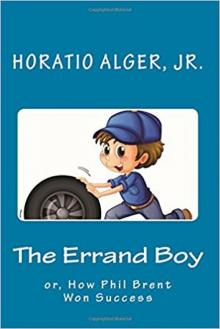 The Errand Boy; Or, How Phil Brent Won Success
The Errand Boy; Or, How Phil Brent Won Success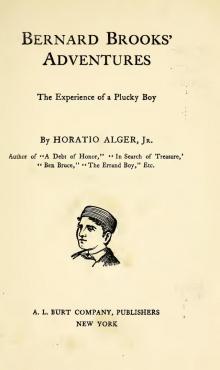 Bernard Brooks' Adventures: The Experience of a Plucky Boy
Bernard Brooks' Adventures: The Experience of a Plucky Boy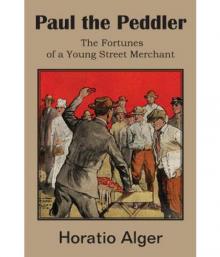 Paul the Peddler; Or, The Fortunes of a Young Street Merchant
Paul the Peddler; Or, The Fortunes of a Young Street Merchant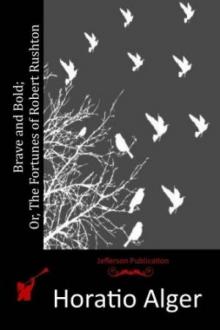 Brave and Bold; Or, The Fortunes of Robert Rushton
Brave and Bold; Or, The Fortunes of Robert Rushton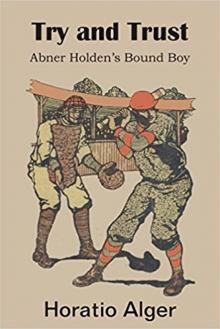 Try and Trust; Or, Abner Holden's Bound Boy
Try and Trust; Or, Abner Holden's Bound Boy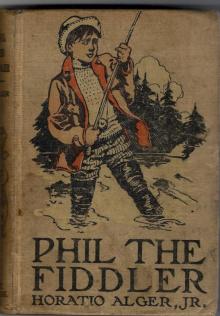 Phil, the Fiddler
Phil, the Fiddler In A New World; or, Among The Gold Fields Of Australia
In A New World; or, Among The Gold Fields Of Australia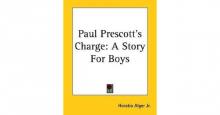 Paul Prescott's Charge
Paul Prescott's Charge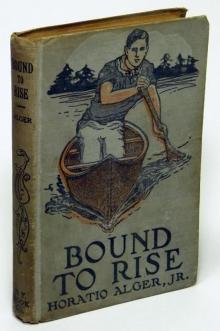 Joe's Luck; Or, Always Wide Awake
Joe's Luck; Or, Always Wide Awake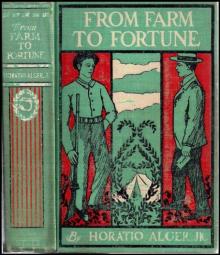 From Farm to Fortune; or, Nat Nason's Strange Experience
From Farm to Fortune; or, Nat Nason's Strange Experience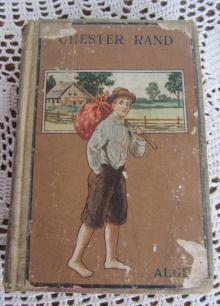 Chester Rand; or, The New Path to Fortune
Chester Rand; or, The New Path to Fortune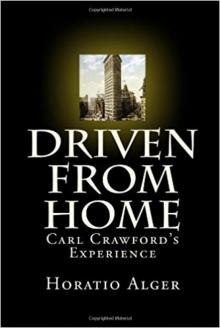 Driven from Home; Or, Carl Crawford's Experience
Driven from Home; Or, Carl Crawford's Experience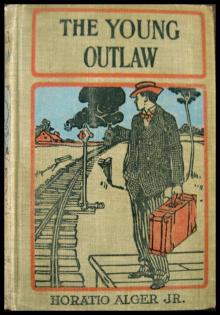 The Young Outlaw; or, Adrift in the Streets
The Young Outlaw; or, Adrift in the Streets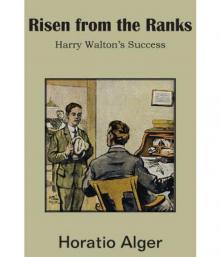 Risen from the Ranks; Or, Harry Walton's Success
Risen from the Ranks; Or, Harry Walton's Success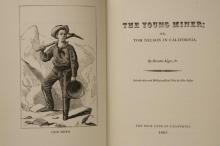 The Young Miner; Or, Tom Nelson in California
The Young Miner; Or, Tom Nelson in California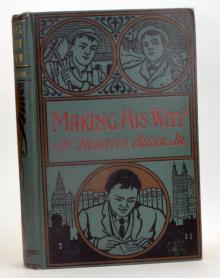 Making His Way; Or, Frank Courtney's Struggle Upward
Making His Way; Or, Frank Courtney's Struggle Upward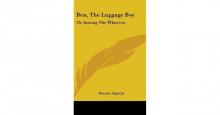 Ben, the Luggage Boy; Or, Among the Wharves
Ben, the Luggage Boy; Or, Among the Wharves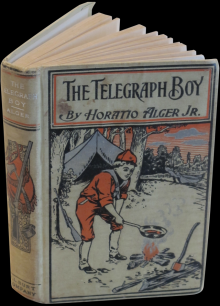 The Telegraph Boy
The Telegraph Boy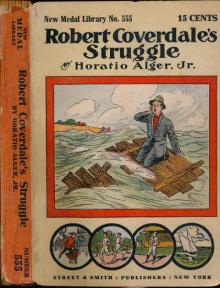 Robert Coverdale's Struggle; Or, on the Wave of Success
Robert Coverdale's Struggle; Or, on the Wave of Success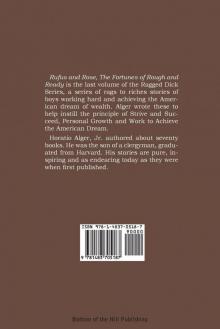 Rufus and Rose; Or, The Fortunes of Rough and Ready
Rufus and Rose; Or, The Fortunes of Rough and Ready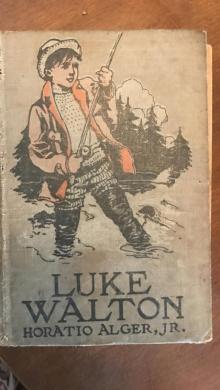 Luke Walton
Luke Walton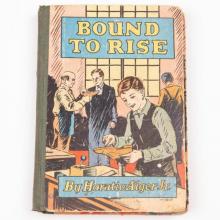 Mark Mason's Victory: The Trials and Triumphs of a Telegraph Boy
Mark Mason's Victory: The Trials and Triumphs of a Telegraph Boy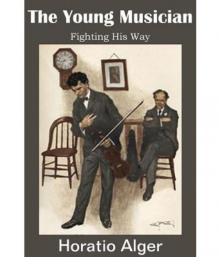 The Young Musician; Or, Fighting His Way
The Young Musician; Or, Fighting His Way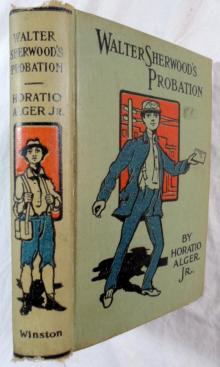 Walter Sherwood's Probation
Walter Sherwood's Probation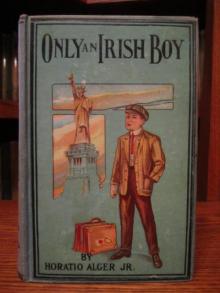 Only an Irish Boy; Or, Andy Burke's Fortunes
Only an Irish Boy; Or, Andy Burke's Fortunes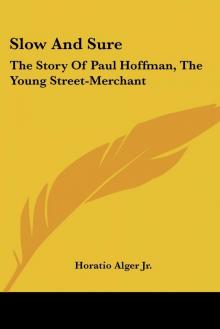 Slow and Sure: The Story of Paul Hoffman the Young Street-Merchant
Slow and Sure: The Story of Paul Hoffman the Young Street-Merchant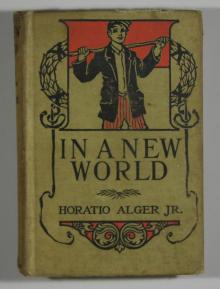 Herbert Carter's Legacy; Or, the Inventor's Son
Herbert Carter's Legacy; Or, the Inventor's Son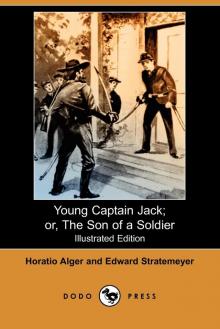 Young Captain Jack; Or, The Son of a Soldier
Young Captain Jack; Or, The Son of a Soldier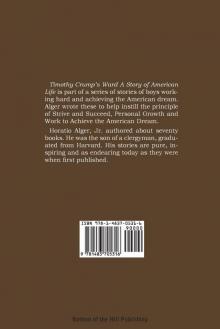 Timothy Crump's Ward: A Story of American Life
Timothy Crump's Ward: A Story of American Life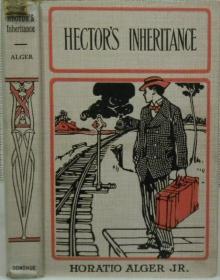 Hector's Inheritance, Or, the Boys of Smith Institute
Hector's Inheritance, Or, the Boys of Smith Institute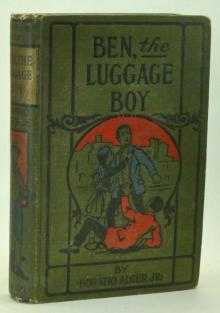 Ben's Nugget; Or, A Boy's Search For Fortune
Ben's Nugget; Or, A Boy's Search For Fortune